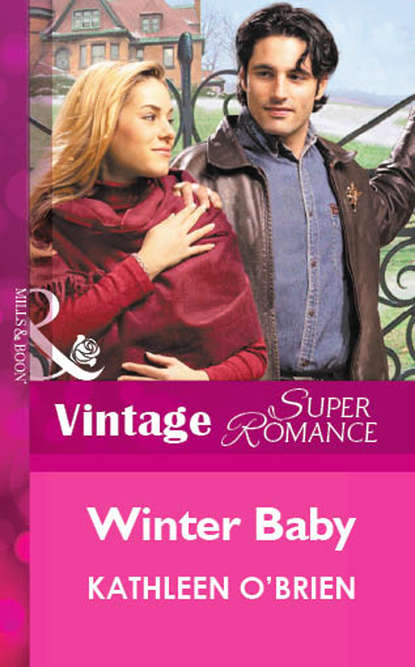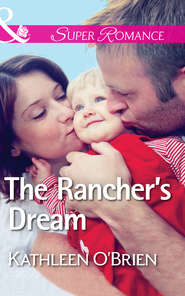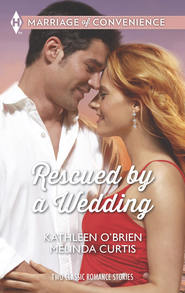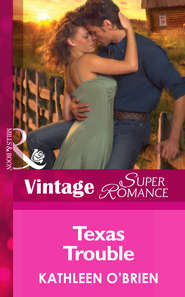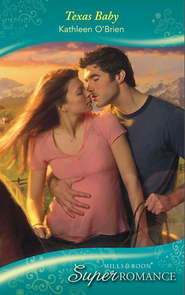По всем вопросам обращайтесь на: info@litportal.ru
(©) 2003-2025.
✖
Winter Baby
Автор
Год написания книги
2018
Настройки чтения
Размер шрифта
Высота строк
Поля
The sheriff shook his head. “Sorry. This is my sister. She’s a little crazy. Recently escaped. I’m taking her in.” He lifted his right elbow to fend off a friendly blow from the woman. “But don’t let her scare you away. Most of us down there in the Glen are perfectly sane.”
EMMA HAD ATTRACTED quite a crowd with her story, and Parker thought if she didn’t shut up pretty soon he really was going to toss her in jail.
Not that they had any room in the jail. Suzie, his part-time clerk, had turned the one holding cell into a replica of the Bethlehem manger, complete with papier-mâché cows and a baby-doll Jesus that, if anyone touched him the wrong way, said in a rather disturbing, machinelike voice, “Betsy needs a new diaper.”
He had hoped that Suzie would take it down now that the new year was here, but she had bristled at the suggestion. Suzie, a seventeen-year-old high school junior, was gunning for an interior design scholarship to NYU, and she expected her manger to clinch the deal. She wasn’t letting anyone dismantle a single straw of hay until she had good pictures for her résumé.
So Parker really had no choice but to let Emma keep regaling the customers of the Candlelight Café with her reenactment of Parker’s rescue on the mountaintop.
“But won’t you let me escort you down the mountain, miss?” Emma’s voice was a syrupy, annoying imitation of Parker’s own. “I am the valiant Sheriff of Firefly Glen. I can protect you.”
Parker growled. Even though Emma was now twenty-six and about to celebrate her first wedding anniversary, she would always be his annoying little sister. They had lost their parents in a car accident three years ago, and the tragedy had been one of the reasons he’d decided to come back to Firefly Glen. He hadn’t liked the idea of Emma here without any family at all. But the move had certainly left him at the mercy of her irrepressible teasing and, even worse, her incessant matchmaking.
“Damn it, Emma, give it up. I just asked the woman if she needed help. It’s my job, remember?”
Emma grinned and tucked into the pumpkin pie Theo Burke had just placed in front of her. “Yeah, but if she’d been a three-hundred-pound logger with a face like a gargoyle, I’ll bet you wouldn’t have stopped.” She turned to her audience. “This lady was gorgeous. Petite, honey-blond hair, great body. Dudley Do-Right here was practically drooling on his boots.”
Parker held out a napkin. “Shut up, Emma. Don’t talk with your mouth full.”
While she chewed, somehow he diverted the conversation, subtly leading Theo and the other customers in a debate about the ice festival, a subject that was always good for a distraction. Eventually the others wandered off, and he breathed a sigh of relief.
Emma could be a royal pain. But he had to admit—at least to himself—that she had been right about one thing. The woman on the overlook had been a knockout. He found his thoughts circling back to their encounter, over and over. She’d been underdressed for the weather, with only a green turtleneck sweater, jeans and a pair of boots. But the sweater had outlined a body that was darned near perfect. And her face had been more than pretty. He remembered the vulnerable curve of her cheek, almost as soft as a child’s. It made an interesting contrast with the strength he had glimpsed in her hazel eyes, the hint of determination in her chin.
Fascinating. He wondered who she was visiting. But that was the advantage of living in such a tiny town. Sooner or later, he’d run into her.
“What’s the matter with you, Emma Tremaine?” Theo Burke had appeared at their side, holding a second piece of pie for Parker. He grimaced. After a sugar rush like this, he’d have trouble staying awake all afternoon. But Theo would be hurt if he didn’t eat it. And besides, it was the food of the gods.
Emma looked up questioningly, her mouth still full of pie.
“Trying to get Parker interested in this woman on the mountain.” Theo scowled. “You don’t want to hook him up with another out-of-towner, do you?”
Emma shrugged, tossing her dark brown bob, the same haircut she’d had since high school. “Well, we’ve got to get him hooked up with someone, don’t we?” Her blue eyes, so like Parker’s own that it was like looking into a mirror, began to dance. “I’m not getting any younger, Theo,” she said plaintively. “I want to be an aunt.”
Theo narrowed her eyes, considering. Though she herself was a spinster, she had appointed herself the official town matchmaker, and she took her job seriously. “Still, there must be a suitable woman here in the Glen—”
Down the next row of tables, someone dropped a plate with a splintering crash. Theo didn’t bother to finish her sentence. She rushed over, ready to comfort her inconvenienced customer and to chasten her clumsy employee with one quick, deadly look.
Parker and Emma shared an amused glance. Theo Burke was famous for treating her customers like royalty. The Candlelight Café lived up to its name. Every table really did have an ivory taper set in a silver candlestick. And real linen, too. Theo trained her teenage waiters to what she called “French standards.” It amused the customers, but it kept them coming back. Where else could you get five-star service with your French fries?
“Seriously, though, Parker—” Emma toyed with the last bit of piecrust on her plate “—aren’t you interested in ever getting married?”
“I’ve been married,” he said calmly, drinking his coffee. “It wasn’t that much fun.”
“Yeah, but you married a bitch.” Parker gave his sister a quizzical look, and she bristled defensively. “Well, I’m sorry. But you did. The way she acted when you decided to come back to the Glen! Man, was she ever a witch.”
Parker put his coffee cup down. “Well, you can’t really blame her. Tina liked being married to a member of the Secret Service. It impressed her friends. And she thoroughly enjoyed having affairs with all the cutest politicians in Washington.” He grinned at his sister. “Apparently she couldn’t work up much enthusiasm for cheating on the sheriff of Firefly Glen.”
Emma eyes were as dark as mud. “I’d like to find that woman and—”
“Let it go, Emma,” Parker said lightly. “A lot of it was my fault, too. She didn’t start out being a bitch.”
That was true. He remembered how hypnotized he had been by Tina’s exciting body, her cover-girl face—the sophisticated pampering she’d showered on him, purring and seducing and flattering.
And he’d never forget how hot they had been for each other. Or how alarmingly fast that heat had burned itself out.
“That’s partly why I’m not eager to try it again.” He heard the sober note in his voice, and he was sure Emma recognized it, too. “Not unless I’m sure. I would have to be one hundred percent positive it’s the perfect woman.”
Emma’s expression was suddenly wistful, her earlier effervescence dissipated. “I don’t think that’s possible, Parker,” she said softly. “Nothing’s ever really perfect.”
He could have kicked himself. Though Emma never outright acknowledged it, he knew something was wrong in her marriage. She’d married Harry Dunbar, Parker’s deputy sheriff, just last year, and for a few months, things had seemed fine. But lately Emma’s natural buoyancy had flattened out. Something was definitely wrong.
Harry had been out of town since before Christmas, visiting his family in New York City. Emma hadn’t gone with him, something Parker couldn’t understand. Their first Christmas, and they spent it apart?
And there was the problem of the upcoming election. Apparently Harry had decided to run against Parker, which made for a damn sticky family situation. Harry had been pretty ticked off last year when, after the old sheriff’s death, the governor had appointed Parker to take over. Harry had fully expected to get the nod. After all, he’d been the deputy sheriff here for years.
So it was not really a shock to discover that Harry planned to oppose him in the election. He might win, too. Harry had lived in Firefly Glen all his life—a real plus with the voters. Some people around here considered Parker a traitor. It was okay to go off to college—everyone did that—but you were supposed to come right back. Parker hadn’t. He’d stayed away for eight extra years, getting his law degree, being a “big shot” in Washington. A member of the Secret Service. “Putting on airs,” Mayor Millner had called it once when he thought Parker wasn’t listening. Glenners didn’t care for “airs.”
Obviously Harry hadn’t consulted Emma about his decision. Rumor had it that Emma had ripped down Harry’s campaign poster the minute she saw it. She had apologized to Parker, and her repressed anger was obvious. He wondered what she had said to Harry.
But she wouldn’t talk about it. In fact, she still insisted everything was fine. And when Harry wasn’t around, like today, she was so much her normal playful self that Parker could forget.
“I know nothing’s perfect,” he said, reaching across the table to lay his hand over Emma’s. He was horrified to discover that it was trembling. “But we don’t have to settle for anything really bad, either, Emmy.”
She looked up and tried to grin. It was such a failure that Parker suddenly wanted to find Harry Dunbar and beat him senseless. “I mean it. We have a right to be happy,” he said tightly.
“Then get married and make me an aunt,” she said, banishing her gloom with an obvious effort. “That’s what would make me happy.”
CHAPTER THREE
AFTER HER ODD but appealing encounter with the sheriff, Sarah’s mood changed completely, and she entered the township of Firefly Glen with a light heart and a happy sense of New Year optimism.
She hardly recognized the place. Winter had completely transformed the summer playground of that visit so long ago. Carrot-nosed snowmen stood sentry at each corner of the town square where she and Uncle Ward had once played Frisbee and licked their melting ice cream from sticky fingers. And the leafy green maples where the Frisbee had finally gotten stuck were now just delicate brown skeletons against the dove-gray sky.
For a lifelong Southerner like Sarah, the sight was pure magic. She drove slowly, drinking in every detail. The shopkeepers here obviously didn’t feel that the arrival of January meant that Christmas decorations must come down. Windows, doorways, streetlights and storefronts were looped with deep green pine garlands threaded with velvety red ribbons. The large tree in the center of the square shone with huge red balls and small twinkling white lights.
And to Sarah’s surprise, the placid serenity she had imagined as she stood on the mountain looking down had been merely an illusion. What a world of teeming life these few blocks held, in spite of the freezing cold and the snow that still fell lightly.
The sign she’d passed on the way in had proclaimed that Firefly Glen had 2,937 residents. Surely every one of them was out here today, bundled up in puffy blue coats, cherry-red knitted hats, green-and-navy-checkered mittens and bright yellow mufflers.
As she watched one little toddler struggle to walk, as stiff-legged as the Michelin Man in his padded snowsuit, she cast a doubtful look at her own light gray wool-blend coat, which lay across the back seat of the rental car. It had been the best she could find at the department stores in Tampa, but she suddenly realized that it wasn’t going to be nearly warm enough for the rigors of a New York winter.
She thought of the long, twisting walk up the path to the front door of Uncle Ward’s medieval mansion. In that flimsy coat, she’d be frozen solid before she had a chance to rap the massive brass knocker. They might not find her until spring.
She began searching the names of the stores she passed, looking for something that might save her.
Adirondack Outerwear. Yes, that sounded perfect. Gratefully she slipped the car into one of the designated parking spaces. Clenching her teeth against the sharp bite of wind, she darted into the store, hoping her charge card could handle the extra expense.
A sweet-toned little bell announced her arrival, but no one came to greet her. In fact, at first sight, the store seemed deserted, the coats hanging abandoned on circular racks, the multicolored mittens lying in neat, forgotten rows under empty glass countertops.





